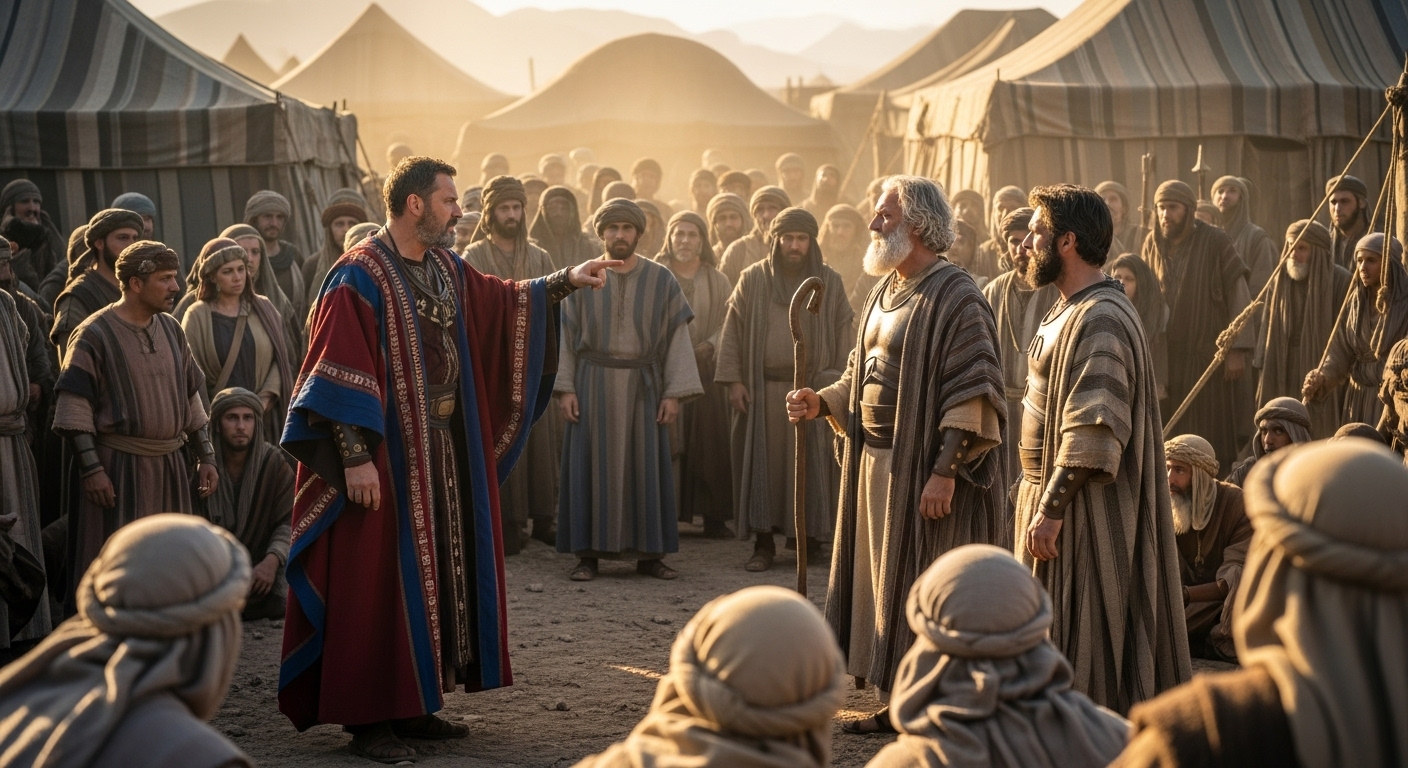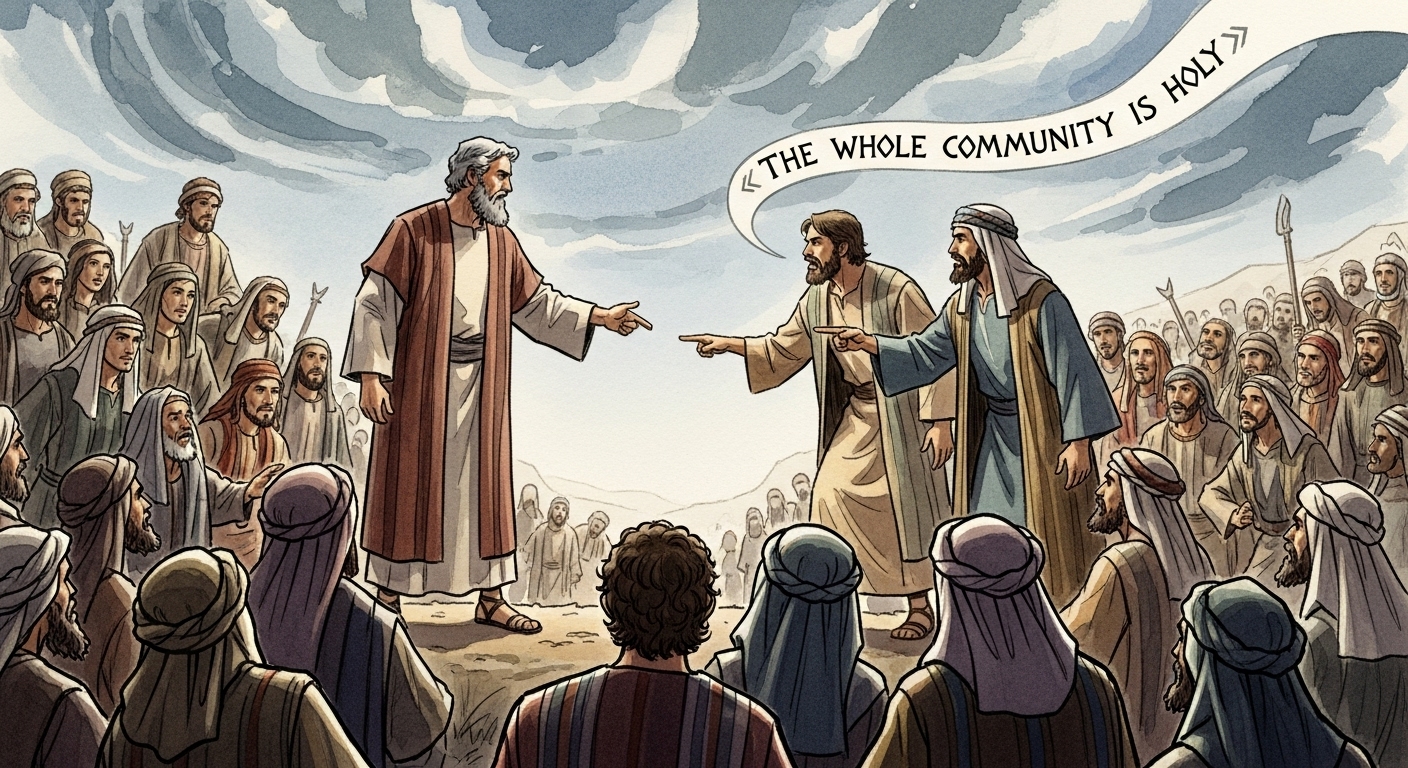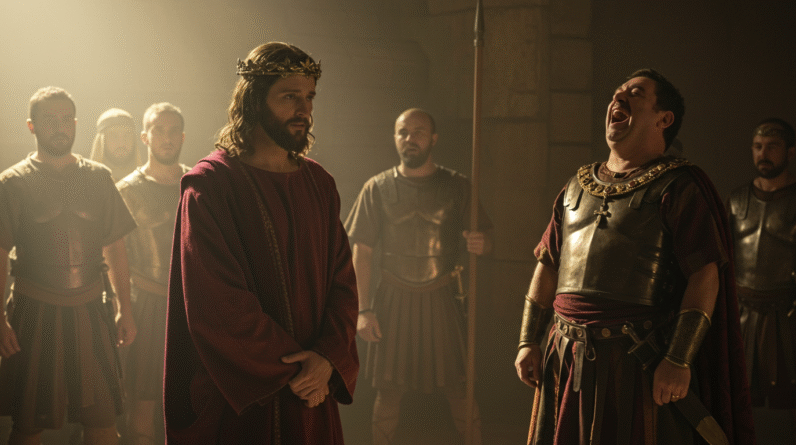Korah – The Enemy of God in the Old Testament

Introduction
Have you ever watched a leader get challenged and wondered, “Why do people rebel?” The story of Korah in the Old Testament gives you a raw, up-close look at rebellion—one that goes beyond politics or personality and reaches into the heart of what it means to oppose God’s order. You’ll find this dramatic confrontation in the book of Numbers, and when you walk through the story, you’ll see how pride, envy, and misunderstanding can turn ordinary people into enemies of God’s purposes. This matters because you’ll recognize the same patterns in workplaces, families, churches, and even inside your own heart. Understanding Korah helps you spot the warning signs and choose a better way.
Who Was Korah?
Korah was a descendant of Levi, the son of Izhar, who found himself among the tribes of Israel following their exodus from Egypt. Despite being a Levite and having a respected position in the Israelite community, he coveted greater authority and was not content with his assignments. His story is primarily found in the Book of Numbers. Korah’s significance in the Old Testament narrative is highlighted through his rebellion against Moses and Aaron, which was emblematic of a deeper struggle with pride and dissatisfaction.
The account of Korah takes place during the Israelite wanderings in the desert, a period filled with trials and divine testing. This atmosphere of uncertainty might have fueled Korah’s ambition, causing him to instigate a rebellion that questioned God’s chosen leaders at the time.
Korah’s Opposition to God
Motivation
Pride and ambition were the primary drivers behind Korah’s opposition to God. His yearning for power and recognition led him to challenge the authority of Moses and Aaron publicly. He argued that the community was holy and questioned why Moses and Aaron held positions of leadership above others. This desire for equal standing or possibly supremacy was a classic case of misjudging divine order, reflecting a broader human issue often seen in power struggles throughout history.
Key Actions
Korah’s opposition to God was conspicuously demonstrated when he, along with Dathan, Abiram, and two hundred and fifty community leaders, confronted Moses and Aaron. They questioned their leadership, saying, “They came as a group to oppose Moses and Aaron and said to them, ‘You have gone too far! The whole community is holy, every one of them, and the LORD is with them. Why then do you set yourselves above the LORD’s assembly?’” (Numbers 16:3). In a direct affront to God’s chosen leaders, Korah’s actions exemplified how his ambition clashed with God’s plans for His people.
Conflict with God’s Will
Korah’s actions went against divine will by attempting to disrupt the established order God had ordained through Moses and Aaron. By challenging this order, Korah sought to assert his own human reasoning above God’s sovereign decision, a dangerous move that led to grave consequences. His challenge was not merely against Moses and Aaron but, by extension, against God’s authority and His plans for the people of Israel.
📖 The Bible Foundation

Numbers 16:1–3 (NIV) “Korah son of Izhar, the son of Kohath, the son of Levi, and certain Reubenites—Dathan and Abiram, sons of Eliab, and On son of Peleth—became insolent and rose against Moses. They came as a group to oppose Moses and Aaron and said to them, ‘You have gone too far! The whole community is holy, every one of them, and the LORD is with them. Why then do you set yourselves above the LORD’s assembly?’”
These are blunt words. In context, Moses has been leading the Israelites out of Egypt, guiding them through a desert of uncertainty. Korah, a Levite with status, gathers a following and accuses Moses and Aaron of elevating themselves above the rest. The passage shows a rebellion that isn’t just political: it questions God’s chosen leadership and misreads what holiness and service mean.
Psalm 106:16-18 (NIV) “They envied Moses and Aaron in the camp; at the Red Sea they said, ‘Was it only with Moses that God was displeased? Did he not also reject us?’ So they plotted against Moses and Aaron, and said, ‘Let us appoint a leader to go back to our possessions.’”
This psalm reflects on Korah’s spirit—envy, jealousy, and plotting. It helps you see that the rebellion didn’t come from a neutral place; it was fueled by discontent and distorted trust in God.
🧠 Understanding the Core Truth
The main point is simple: the Korah rebellion teaches you that pride and envy will twist truth into justification for rebellion. When people like Korah claim equality in a way that denies God’s appointment, they cross from legitimate questioning into spiritual rebellion. The story shows the danger of equating “everyone’s worth” with “everyone’s role,” ignoring that God may assign different responsibilities for a reason. That doesn’t mean abuse is acceptable, but it does mean you should be careful when grievance becomes entitlement.
When you read the events—Korah’s challenge, the test with the censers, the earth swallowing the rebels, and the miraculous sign of Aaron’s staff budding (Numbers 17)—you’re witnessing a confrontation between human pride and divine authority. The core truth: God honors His design, and He warns against rebellion motivated by pride.
🌊 Going Deeper — The Hidden Meaning

Beneath the surface drama is a deeper spiritual lesson about motives and heart posture. Korah wasn’t only arguing about fairness; he was rallying people by appealing to a truth—everyone is holy—that he twisted into a weapon. The hidden meaning is this: truth, when pulled out of its full context, becomes dangerous. Holiness in Scripture is relational to God, not merely a social or political status. If you treat holiness as a democratic badge you can claim to justify your challenge, you’ve missed what it’s for.
Consider the test God gave: each challenger brought a censer before the tabernacle. Most censers were consumed by fire; Aaron’s alone remained and produced life (Numbers 16–17). That shows that God’s choice for leadership was not personal nepotism but divine selection. The heart-level lesson for you: examine your motives. Are you challenging for justice, for attention, or for a sense of superiority? Ask God to refine your heart so your actions come from humility rather than entitlement.
💡 Modern Connection — Relevance Today

Korah’s story isn’t ancient history that’s unrelated to your life. You can see the pattern in corporate boardrooms, church conflicts, family power struggles, and social movements. Someone who feels overlooked might gather supporters and claim fairness as justification for undermining leadership. In the workplace, that person can inspire a walkout. In a church, it can lead to schisms. Online, it becomes viral campaigning that often lacks humility.
You need to recognize two things: first, genuine leadership should be accountable and servant-hearted, and second, not every act of disagreement is righteous. When you’re confronted with leaders you believe are wrong, approach with truth and humility. Don’t let righteous-sounding words mask pride. Conversely, if you’re in leadership, be transparent and open to correction—but also rooted in prayerful discernment so you don’t mistake popularity for God’s call.
Lessons We Can Learn from Korah
Spiritual Insights
Modern readers can draw important spiritual insights from Korah’s story. It teaches us about the corrosive nature of pride and the importance of humility. By examining Korah’s life, we understand that seeking to exalt oneself leads to downfall. It is a powerful reminder to submit to God’s authority and trust His plans for us.
Warnings
Korah’s rebellion serves as a warning to all believers about the consequences of challenging God’s anointed leaders and doubting His wisdom. His fate reminds us to avoid harboring prideful and rebellious attitudes that lead us away from God’s will. This cautionary tale directs believers to remain vigilant against thoughts of discontent and arrogance that can take root in our lives.
❤️ Practical Application — Living the Message
How do you live out the lessons from Korah today? Start small and concrete. First, check your motives: before you join or start a critique, ask what you hope to gain and whether you’re seeking God’s wisdom or your own vindication. Second, use proper channels—speak directly and respectfully to those in leadership rather than rallying support behind closed doors. Third, cultivate humility by practicing gratitude and service; the more you serve without recognition, the less likely you’ll let envy drive you.
Also, hold leaders accountable with love. Bring concerns with specific examples, open ears, and a willingness to work toward solutions. Pray for those you disagree with; prayer recalibrates your heart and helps you see beyond the immediate offense. These steps will keep you from becoming like Korah—someone who reasons their way into rebellion.
🌿 Faith Reflection Box
Take a moment. Where have you felt overlooked or resentful lately? Ask God to show you whether that feeling points to a need for growth, correction, or action.
Key Takeaways
- Pride can turn truth into a weapon; examine your motives before you revolt.
- God’s design includes different roles; equality in value doesn’t erase distinct responsibilities.
- Approach conflict with humility—speak clearly, love directly, and pray persistently.
- Serve anonymously to combat envy; service shapes character.
- Trust God to confirm leadership through truth, not popularity.
👉 Q&A
Q1: Was Korah’s challenge a legitimate call for equality, or was it sin? Answer: Korah’s language—“the whole community is holy” (Numbers 16:3)—sounds right at first, but you need to consider motive and method. He twisted a truth (that all Israelites had value) into a justification to overturn God’s appointed order. His approach ignored God’s design and escalated into rebellion. The Bible shows God values people but also sets roles—see Numbers 16:1-3 and Hebrews 13:17 on trusting leaders. Legitimate calls for fairness are necessary, but when they’re driven by envy or personal gain, they become sinful. Ask God to test your heart and your methods before you act.
👉 Related: King Nebuchadnezzar and the Fiery Trial in Daniel 3
Q2: How should you respond when a leader is genuinely wrong? Answer: You respond with courage and humility. First, pray for discernment—ask God to clarify whether the issue is sin, mistake, or a difference of opinion. Second, approach the leader privately with grace and specifics, as Jesus taught in Matthew 18:15. If the leader is unresponsive, involve others in a measured, biblical way. Remember, your goal is restoration and truth, not rebellion. Always avoid gossip and mob mentality. Scripture supports correction done lovingly: see Galatians 6:1.
Q3: What can leaders learn from the Korah rebellion? Answer: Leaders should learn humility, transparency, and accountability. Korah’s challenge exposed a disconnect: people felt unheard. Leaders must listen, explain decisions clearly, and protect against favoritism. But they must also hold to God’s calling and not be swayed by popularity. Trust that God provides confirmation—like Aaron’s budding staff in Numbers 17—but practice servant leadership daily so followers see authenticity. Encourage feedback, face criticism calmly, and keep prayer at the center of your decisions. That builds resilience against divisive movements.
👉 See also: Balak: The King Who Challenged God’s Will
🙏 Conclusion & Reflection
Korah’s rebellion gives you a cautionary tale: noble-sounding phrases can hide ugly motives. You’re invited to examine your heart, practice humility, and engage in conflict in ways that seek restoration rather than victory. Whether you’re a leader or a member of a community, let the Korah story teach you to value people without letting envy rule you. Pray for discernment, and ask God to shape your motives so your actions reflect His wisdom.
A short prayer: Lord, guard my heart from envy and pride. Give me humility to serve, wisdom to speak truth in love, and courage to follow Your ways even when they’re costly. Help me to build up others and to honor Your design. Amen.

More Inspiration Awaits — Read These Next
👉 For deeper insight into Isaiah 40:31 and how it renews your strength in both faith and daily life
👉 For practical lessons on compassion and neighborliness from the Good Samaritan
👉 For a clear explanation of what we can learn from the Parable of the Good Samaritan
👉 For meaningful insights from the Parable of the Pearl and its hidden treasures
👉 For a deeper look at the Rich Man and Lazarus and what it reveals about the afterlife
👉 For guidance on the Parable of the Ten Virgins and preparing for God’s Kingdom
👉 For clarity on the Parable of the Lamp and how it calls us to shine our light
👉 For insights from the Parable of the Wedding Feast and the meaning behind the invited guests

📘 Jesus and the Woman Caught in Adultery – Grace and Mercy Over Judgement
A powerful retelling of John 8:1-11. This book brings to life the depth of forgiveness, mercy, and God’s unwavering love.
👉 Check it now on Amazon 🛒💥
🔥 “Every great message deserves a home online.” 🌍💬🏡
Don’t let your calling stay hidden. Start a Christian blog or website using Hostinger — with 99.9% uptime, a free domain, and SSL, your voice can shine for God’s glory anytime, anywhere.
💥 Begin today. 🛒 Try it RISK-FREE! ✅
✝️ “Your body is God’s temple — care for it with purpose.” 💪💖🏛️
Renew your energy and restore balance naturally. Mitolyn helps support a healthy metabolism, giving you the vitality to live out God’s calling with strength and confidence.
🔥 Unlock Your Metabolic Power! ⚡Burn More Calories & Feel Great With Mitolyn. 💪
👉 Start Today. 🚀 Check Price Now. 🛒💰
💰 As a ClickBank & Amazon Affiliate, I earn from qualifying purchases.
📖 Acknowledgment: All Bible verses referenced in this article were accessed via Bible Gateway (or Bible Hub).
🚀 Want to explore more? 👉 Dive into our new post on Why Jesus? and experience the 🔥 life-changing truth of the Gospel!








